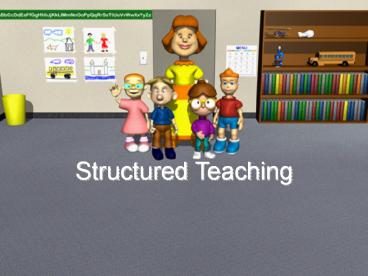Structured Teaching
1 / 17
Title:
Structured Teaching
Description:
Structured Teaching What is Structured Teaching? Structured Teaching is a system for visually organizing the environment and activities, to help students with autism ... –
Number of Views:123
Avg rating:3.0/5.0
Title: Structured Teaching
1
Structured Teaching
2
What is Structured Teaching?
- Structured Teaching is a system for visually
organizing the environment and activities, to
help students with autism understand what is
expected of them.
3
Components of Structured Teaching
- Physical Structure
- Schedule
- Work System
- Visual System
4
Physical Structure
- This is the way the classroom environment is set
up so that each area of the classroom is visually
organized, each space has a specific purpose and
set of expectations. - Clear physical and visual boundaries
- Boundaries are in place to help the child
understand where an area begins and ends. It
helps to establish context and segments the
environment for the student.
5
Physical Structure
- Minimize visual and auditory Distractions
- Helps the student focus on the concept and not
the details. - Develops basic teaching areas Independent work,
One-on-One, Leisure, Transitions, Group,
Computer, Snack, Lunchbased on the needs of the
students.
6
Example of Physical Structure
Listening Table Area
One-on-One Learning Area
Group Activity Area
7
Schedules
- The Daily Schedule tells the student where they
need to be, where activities will occur, and the
order in which they will to take place. - The length of the schedule is dependent upon the
needs of the individual student. It can vary
from item, a full day, a full
week or a month.
8
Types of schedule
- Object schedule
- Object card schedule
- Photograph schedule
- Picture/Symbol schedule
- Picture/Symbol with
- written schedule
- Written list schedule
- Sentence schedule
9
Examples of Schedule
Word Checklist Schedule Single object
Schedule with
transitional object/cue
Single Word schedule
with
transitional cue Picture/Symbol schedule
with transitional cue
Object Sequence schedule with
transitional object/cue
10
Work System
- This is what tells the students what they will be
doing once they are where they need to be in the
environment. - The Work System clarifies information for the
student.
11
The Work System tells the student
- What work needs to be done?
- Use visually defined containers or boxes for the
work items. - How much work do I need to do?
- A visually defined system should make it clear
exactly what needs to be completed.
12
The Work System tells the student
- What should I do with my work when Im finished?
- A routine should make it clear exactly what
needs to be completed . - What should I do next?
- A transition to indicate what
- is next in the schedule or
- routine .
13
Examples of Work System
Object Match work system
Left to right work system
Matching numbers work system
Written instruction work system
14
Visual Structure
- This is what helps students keep working by
providing information within the environment that
clarifies, organizes or instructs.
15
Visual Structure
- It clarifies by drawing attention to the
important detail - (labeling, highlighting, color-coding.anythin
g that makes the relevant more obvious). - It organizes materials in the space and sequences
(all items in their place, limited number or
spacing anything to organize) - It instructs by living visual information about
how to complete the task (jigs,arrows,pictures,pro
duct samplesanything that makes no verb
instructions necessary)
16
Examples of Visual Structure
It clarifies
The task is clarified by the color
coding of the writing and the color of the
vehicles.
The task is clarified by the highlighted letters
to emphasize the state abbreviation.
17
Structured Teaching
The key to effectively using each of these
components is individualization. A classroom that
is physically well-organized and scheduled will
not benefit students unless individual student
strengths and needs are considered in the
planning phase. A teacher who uses teaching
methods like prompts and reinforcement cannot do
so effectively without assessing individual
student interests and learning styles. http//www
.teacch.com/structureteach.html































